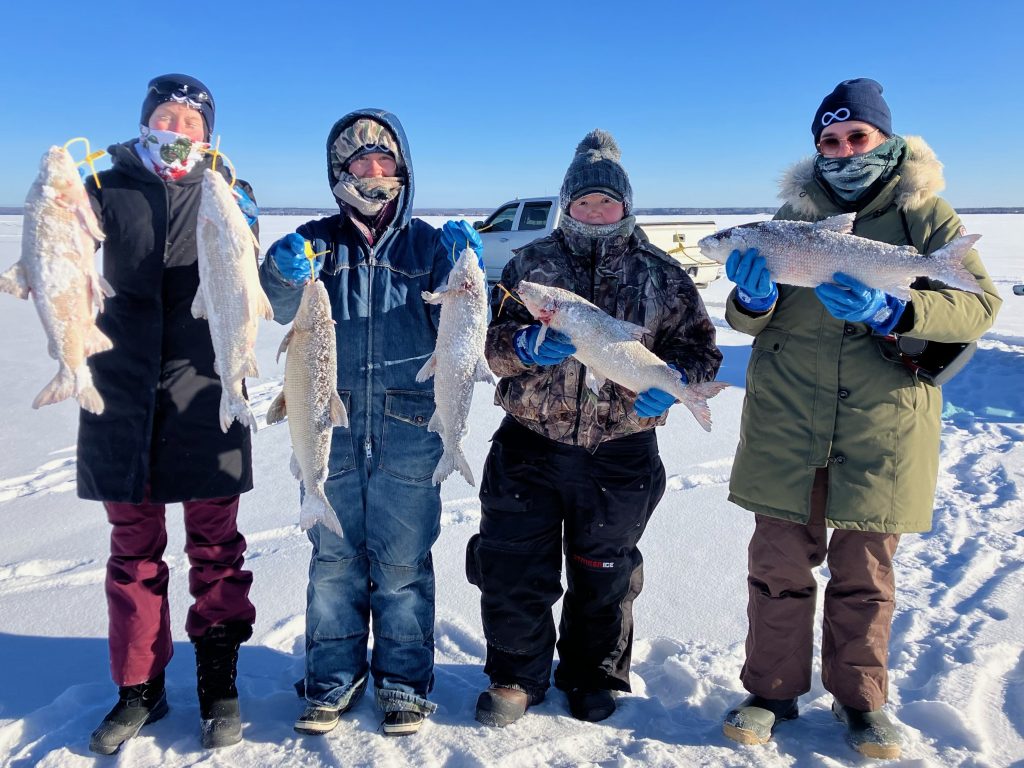MNA releases results from 2022 fish health monitoring
Posted on: Apr 17, 2023
Métis Nation of Alberta releases results from 2022 fish health monitoring
Environment and Climate Change Department Report investigates Alberta fish health and water quality concerns

The Métis Nation of Alberta just released a report from fish health monitoring that took place last year on Sturgeon Lake, Lac La Biche, Moose Lake, Lesser Slave Lake, and Pigeon Lake, indicating that fish tissue samples from these lakes showed concentration levels of mercury and polycyclic aromatic hydrocarbons (PAHs) below Alberta’s recommended consumption limit. Overall, results suggest the concentration of mercury and PAHs are small enough that the human body will metabolize them faster than they will accumulate. Please see the report here.
The fish monitoring program started in 2021 as an addition to the MNA’s environment and climate monitoring initiative, Askîy, meaning earth or land in Cree. The fish monitoring program was launched to assess fish health for lakes MNA Citizens identified to be of concern and/or of importance to support traditional harvesting activities. For all fish sampled, data was collected on species, weight, length, condition, and palatability. For the past three years, teams of MNA staff and knowledgeable Métis harvesters have sampled fish from a variety of lakes across Alberta, using methods weaving together Métis knowledge and western science.
“Through Askîy, the Environment and Climate Change Department engages with MNA Citizens, hears their climate and environment related concerns, and designs and implements projects to monitor and address them,” said MNA Manager of Environment, Kimberly Mosicki. “Concerns around fish health, abundance, and water quality are repeatedly expressed and are priorities for us, so that Métis harvesters can continue to safely fish and exercise their rights.”
From February 21-25, 2023, MNA Environment and Climate Change staff and Métis harvesters went to Calling Lake, Lesser Slave Lake, Sturgeon Lake, and Pigeon Lake for this year’s initiative, where they caught 94 fish including lake whitefish, walleye, northern pike, and burbot. Monitoring locations are selected annually, taking into consideration available data, citizen concerns, use, and the presence of target fish species, such as walleye and lake whitefish – two prized fish for Métis harvesters.
“Pollution of rivers and lakes need to be addressed as soon as possible, or the fish we rely on for our livelihood and wellbeing will become extinct,” said Métis harvester, Dean Fahner. “Harvesting has always been an integral part of Métis culture and it’s our collectively held right. With that comes responsibility toward protecting our lands, waters, and wildlife, which we’ve been working hard to do for generations.”
A new addition to Askîy fish monitoring in 2023 was a youth monitor contest, where four Alberta Métis youth aged 18-29 were provided the opportunity to spend a week ice fishing and learning scientific methods and sustainable harvesting practices firsthand from Métis harvesters.
“Many of our Métis youth who grow up in urban environments don’t often have opportunities to connect with the land in this way,” said MNA Environment and Climate Change Engagement and Policy Manager, Jennifer Pylypiw. “Their families may have practiced harvesting years ago, but those traditions may have not been passed down. Initiatives like Askîy provide an important opportunity for young MNA Citizens to reconnect with the land and Métis culture.”
As part of Askîy, a series of monitoring projects have been running since March 2020, focused on studying plants, fish, and wildlife across Alberta. Monitoring projects have focused on topics including migratory bird harvests, native bee abundance and distribution, and berry health and productivity.
With the MNA’s ratification of its Otipemisiwak Métis Government Constitution in November last year and recent signing of the Métis Self-Government Recognition and Implementation Agreement with Canada—both major steps forward on the path to self-government—the Environment and Climate Change Department will be able to provide expanded and improved programming moving forward.
Please see here for a folder of images from this year’s ice fishing and a video here. Interviews are available upon request.
For media inquiries:
Victoria Belton
victoria.belton@mediaprofile.com
416-997-5179